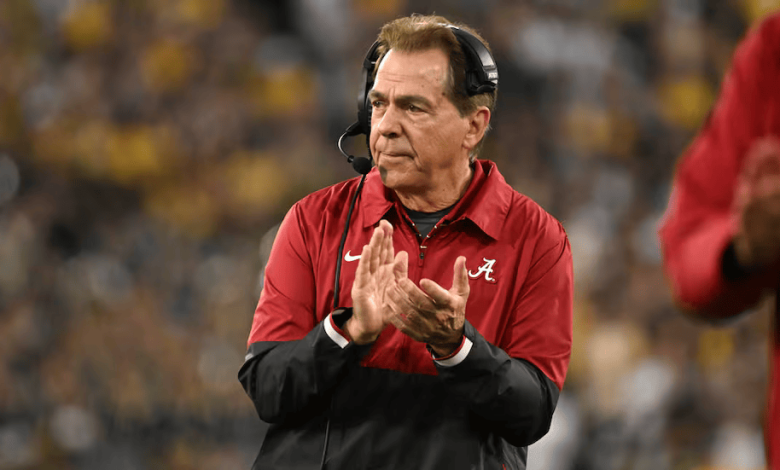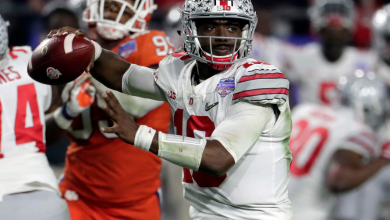Nick Saban, the former football coach of Alabama, will be admitted into the College Football Hall of Fame.

Nick Saban, a name synonymous with success and dominance in college football, is set to be inducted into the College Football Hall of Fame in recognition of his extraordinary contributions to the sport. His induction is a long-awaited honor, one that acknowledges not only his unparalleled achievements but also the indelible impact he has had on college football. Over a career that spanned decades, Saban established himself as one of the greatest coaches in the history of the game, reshaping the landscape of college football and setting new standards for excellence.
Saban’s journey to the College Football Hall of Fame is a culmination of hard work, an unrelenting pursuit of excellence, and a unique ability to adapt to the ever-changing dynamics of college football. With multiple national championships, a legacy of producing NFL talent, and a reputation for building dominant programs, Saban’s career is one that future generations of coaches and players will look to for inspiration.
This article takes a deep dive into the incredible career of Nick Saban, his journey to becoming one of the most decorated coaches in the history of college football, and the significance of his upcoming induction into the College Football Hall of Fame.
1. The Early Years: Laying the Foundation
Nick Saban’s story begins far from the spotlight, in Fairmont, West Virginia, where he was born on October 31, 1951. Raised in a working-class family, Saban’s early experiences shaped his relentless drive and work ethic. His love for football began in high school, where he played as a defensive back. After high school, Saban went on to play college football at Kent State University, where he was a standout defensive back under coach Don James.
Though Saban’s playing career was not marked by national recognition, it laid the foundation for what would become one of the most impressive coaching careers in the history of the sport. His time at Kent State gave him a firsthand understanding of the game’s intricacies, and it was there that he developed a deep appreciation for coaching. After graduating, Saban began his coaching career as a graduate assistant at Kent State, working alongside James and learning the nuances of coaching at the collegiate level.
From Kent State, Saban worked his way through various coaching positions, including stops at Syracuse, West Virginia, and Ohio State. His early years as an assistant coach helped him build the expertise that would later define his coaching philosophy. Saban’s attention to detail, discipline, and ability to teach the fundamentals of the game set him apart from many of his peers.
2. Climbing the Coaching Ladder: Michigan State and LSU
Saban’s first head coaching job came in 1995 when he was hired to lead the Michigan State Spartans. In his first head coaching position, Saban quickly turned around a program that had been struggling for years. He improved the team’s recruiting and made Michigan State competitive in the Big Ten. Saban’s success at Michigan State laid the groundwork for the next stage of his career, and it was clear that he had the ability to elevate any program he touched.
After five successful seasons at Michigan State, Saban made the jump to a bigger stage when he was hired as the head coach at LSU (Louisiana State University) in 2000. His time at LSU was marked by immediate success, and he quickly turned the Tigers into one of the premier programs in college football. In 2003, Saban led LSU to a national championship, cementing his reputation as one of the game’s elite coaches. The championship was a testament to Saban’s ability to build a complete team, with a dominant defense, a potent offense, and special teams that excelled in critical moments.
During his time at LSU, Saban built a program that became a perennial contender for SEC and national titles. His ability to recruit top-tier talent, develop players, and prepare them for the NFL was evident in his success at LSU. Players like JaMarcus Russell, Glenn Dorsey, and Tyrann Mathieu became household names under Saban’s watch, and the LSU Tigers became known for their physicality, discipline, and strong fundamentals.
3. The Alabama Era: Building a Dynasty
Nick Saban’s arrival at the University of Alabama in 2007 marked the beginning of a new chapter in college football. The Crimson Tide had experienced a period of underachievement following the departure of legendary coach Bear Bryant, and Alabama was in need of a leader who could return the program to national prominence. Saban was the perfect fit for the job, and his impact was immediate.
Saban took over an Alabama program that had been struggling and quickly rebuilt it into a powerhouse. The 2008 season saw Alabama win the SEC West and return to national relevance, but it was in the years that followed that Saban’s true mastery as a coach began to emerge. In 2009, just two years after his arrival, Saban led Alabama to the national championship, defeating Texas in the BCS National Championship Game. The win marked the beginning of a dynasty that would dominate college football for the next decade.
Under Saban’s leadership, Alabama became the gold standard for college football programs. His ability to recruit top talent, develop players, and build a strong, disciplined team culture set the foundation for sustained success. From 2009 to 2019, Alabama won five national championships, including a dominant victory in 2015 against Clemson, and maintained a stranglehold on the SEC.
What made Saban’s Alabama teams so successful was not just their talent but the culture he instilled. Alabama’s defense, known for its suffocating pressure, run-stopping ability, and disciplined play, became a hallmark of the program. Meanwhile, Saban’s offense evolved over time, embracing the spread offense while still remaining true to the power running game. This adaptability to changing trends in the game kept Alabama at the forefront of college football, regardless of the challenges the sport presented.
Saban’s impact on the program extended beyond the field. His influence was felt in the lives of his players, who were molded not only into football players but also into leaders and men of character. The discipline, work ethic, and mental toughness instilled by Saban turned Alabama into a true football factory, churning out NFL talent year after year. Players like Julio Jones, Amari Cooper, Tua Tagovailoa, Derrick Henry, and Minkah Fitzpatrick went on to successful NFL careers, serving as testaments to Saban’s ability to develop top-tier talent.
4. National Championships, SEC Titles, and Dominance
Nick Saban’s success at Alabama is unparalleled in the modern era of college football. His ability to win national championships and SEC titles has solidified his place as one of the greatest coaches in history. In total, Saban has won seven national championships (six with Alabama and one with LSU) and 12 SEC titles, making him the most successful coach in the history of the Southeastern Conference.
What sets Saban apart from other legendary coaches is his consistency. While many coaches have enjoyed periods of success, Saban’s ability to maintain excellence year after year is what truly distinguishes him. Whether Alabama was led by an experienced quarterback like AJ McCarron, or a young star like Tua Tagovailoa, Saban was able to adapt to the strengths of his players and build championship-winning teams.
In addition to national championships, Saban has been named SEC Coach of the Year multiple times, and his teams have been perennial contenders in the College Football Playoff (CFP). Alabama has appeared in the CFP every year since its inception in 2014, further solidifying the program’s dominance under Saban’s leadership.
5. Saban’s Influence on College Football
Nick Saban’s impact on college football extends far beyond the championships and titles he has won. He has changed the way the game is played, particularly in terms of recruiting and player development. Saban’s emphasis on speed, conditioning, and physicality has influenced how teams build their rosters and approach their games. His meticulous attention to detail, strategic game plans, and ability to adapt to changing trends in college football have made him a trendsetter in the sport.
One of Saban’s key contributions to the game is his ability to evolve as a coach. Early in his career, Saban’s teams were known for their dominant defenses, but as the game evolved, so did Saban’s coaching style. His willingness to adapt to the changing landscape of college football, particularly the rise of the spread offense, has kept Alabama at the forefront of the sport. Saban’s ability to balance offense and defense while maintaining a commitment to fundamentals has been a key part of his sustained success.
Moreover, Saban’s influence has been felt in the NFL, where his former assistants have gone on to become head coaches in their own right. Coaches like Kirby Smart (Georgia), Jimbo Fisher (Texas A&M), and Lane Kiffin (Ole Miss) have all worked under Saban and have implemented his philosophies at their respective programs. Saban’s coaching tree continues to grow, further solidifying his legacy as a teacher and mentor.
6. A Lasting Legacy: Saban’s Hall of Fame Induction
As Nick Saban prepares to take his place in the College Football Hall of Fame, his legacy is secure. He has not only achieved unparalleled success on the field but has also shaped the future of college football in ways that will be felt for generations to come. His impact on the players he has coached, the coaches he has mentored, and the game of college football itself is immeasurable.
The College Football Hall of Fame induction is a fitting tribute to a coach who has dedicated his life to the sport and has raised the standard for excellence in college football. As Saban is honored for his achievements, it is clear that his place in the Hall of Fame is not just about the championships he has won, but about the way he has transformed the game and the lasting legacy he leaves behind. Nick Saban is more than a coach—he is a pioneer, a leader, and a true legend of college football. His induction into the Hall of Fame is a well-deserved recognition of his extraordinary contributions to the sport.









